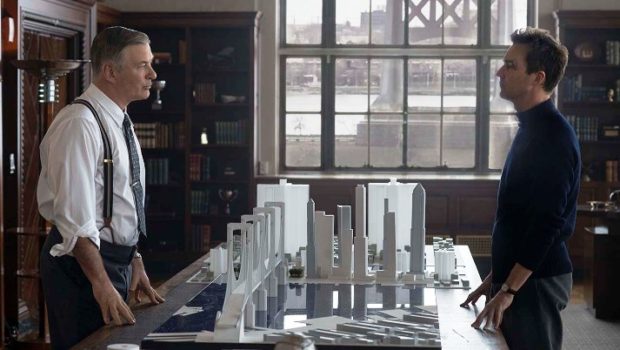 Edward Norton is the director and lead actor of this entertaining detective mystery set in 1950s Brooklyn, a story that features political corruption and family intrigue.
Edward Norton is the director and lead actor of this entertaining detective mystery set in 1950s Brooklyn, a story that features political corruption and family intrigue.
Edward Norton has long been one of the most talented and versatile American film actors. Now he’s written his first screenplay and directed his second film, called Motherless Brooklyn. It’s adapted from a well-regarded 1999 crime novel of the same name, by Jonathan Lethem. I haven’t read that book, so I can only evaluate the film on its own merits. But from what I’ve heard, it’s very different from the book. The novel’s time frame is contemporary; Norton has moved it to the 1950s. The novel presents a full portrait of the main character, including his childhood and thinking process; Norton doesn’t try to do that. And the mystery itself has been changed substantially. It sounds as if he took Lethem’s central character, a small-time detective named Lionel Essrog, and devised a mostly brand new story for him.
Norton plays Lionel, part of a seedy Brooklyn detective agency whose boss, Frank Minna, gets bumped off early in the film. Frank had pulled Lionel, along with the three other guys in the agency, from a Catholic orphanage, and took him under his wing. Lionel loved Frank, so naturally he wants to find out who ordered him killed and why. The mystery centers on a young black woman named Laura, a housing rights activist played by Gugu Mbatha-Raw. She’s one of the people campaigning against the development schemes of New York’s most powerful builder, Moses Randolph, an obvious reference to the notorious city planner Robert Moses. And in the scheme, a large black neighborhood will be torn down to make way for a new highway and luxury apartments. There’s something hidden in this story that seems to have caused Frank to have been killed for snooping, and anyone who gets too close to the truth is in just as much danger. In the course of his investigation, Lionel also meets a scruffy looking provocateur named Paul, played by Willem Dafoe, who warns him of the danger posed by Moses Randolph.
One very unusual element sets this detective mystery apart. Lionel suffers from Tourette’s Syndrome, a neurological disorder causing muscular tics that include twitching, coughing, and facial movements. There are also vocal symptoms, often the shouting of strange, nonsensical, and inappropriate expressions. Norton really goes to town with this aspect of the character—Lionel’s sudden outbursts, even when the situation is quite serious, are sometimes hilarious, especially watching the other characters react to them. At the same time, Tourette’s isn’t portrayed strictly for laughs. Lionel makes it clear that these symptoms are involuntary and the source of a lot of suffering. We learn more about Lionel as a character as the film proceeds, so his personality and his intelligence become more important to us than the superficial impressions created by his disease. The tension between the reality of a human being’s true character and the perception of him as a “freakshow” (one of Lionel’s nicknames) evokes an ambivalence that I think works beautifully.
There’s a bunch of talented actors in this picture, including Alec Baldwin as Randolph, whose depiction of Donald Trump on “Saturday Night Live” can’t help but be something of an influence here; Bobby Cannavale as one of Lionel’s partners in the agency, Michael Kenneth Williams as a jazz trumpeter with some connection to Laura, and Bruce Willis as Lionel’s mentor Frank Minna.
I really miss these kinds of Hollywood detective movies, with multiple characters, complicated plots, and clever dialogue. In the midst of all the dumbed-down stuff we see nowadays in the multiplexes, Motherless Brooklyn is a refreshing and entertaining relief.

Adam Sandler is excellent as a New York gem dealer in trouble for gambling debts in this high octane drama from Josh and Bennie...

Raoul Peck’s documentary explores the life and thought of George Orwell, and how his political insights are relevant today. Haitian filmmaker Raoul Peck has...

The best film of 2013 may have been something I didn’t see, or didn’t even have a chance to see. There’s a wealth of...